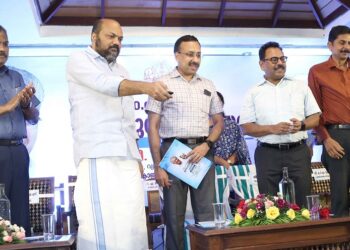The industrial sector in the country is going through a series of challenges. The neo liberalistic policies of the Union Government have almost crippled the public sector with the major share of the public enterprises being surrendered to the corporate sector. The central government is moving ahead with the selling of the shares of profitable public enterprises and privatization of the non-profitable public enterprises.
The Defence, Iron and Steel, Energy, Medicine, Air Force and Insurance sectors are facing major threats. The central government is operating hand in glove with the corporates by undervaluing the asset value of public enterprises and selling them to private players for a song..
Based on the population ratio, above three percent of the total investment made in the public sector should come to the State, but till this time this has not increased. In the financial year 2011-12, it was 2.06 percent and it came down to 1.98 percent in 2014-15. This figure will further go down with the closure of Central public sector units. The crisis in Central public sectors units is not due to labour unrest or lack of proper working hours but due to the draconian policy to privatise them. It is at this juncture that the State Government took the decision to intervene in this issue and do the needful so as to retain these units in the public sector itself.
This Government has made enviable strides in the industrial sector by putting back the sector on a growth path. The Government could provide a ray of hope to the employees who were reeling under extreme difficulties. The support for loss making units, revival packages for traditional sectors like handloom and the reopening of textile mills could be seen as positive steps in this regard. When the UDF Government demitted office, the total loss of public sector units was Rs 131.60 crores. This government could settle more than 70 crores in the first year itself. According to the current half yearly report, the total profit of PSUs stands at Rs 34.19 crores. This can be seen as a major achievement compared to the huge losses during the previous fiscal. The Plan share for the Public Sector was raised to Rs 270 crores from Rs 100 crores. A professional approach was adopted for the revival and maintenance of public sector companies.
In order to implement the Ease of Doing Business by bringing in a single window clearance scheme for various licenses for industries, the Government has issued an ordinance titled. ‘The Kerala Investment Promotion and Facilitation Act 2017’. Almost seven Acts and ten Rules will be amended by this ordinance which will pave the way for a revolutionary change in the State.
Textile Industry
The Textile Industry of Kerala is spread across various units from spinning to garment manufacturing. There are 14 spinning mills functioning in the State. 297228 spindles, 680 rotor machines and 614 machine looms are established with the financial assistance of state government. These mills provide direct employment to 5000 people and indirect jobs to 15,000. This Government sanctioned an extra amount of Rs 15 crores other than the budget allocation for purchasing cotton which could give a new lease of life to these mills. The Centralized Cotton Purchase Committee which has been reinstated during this period could ensure timely supply of cotton to these looms.
Handloom industry
Among the 621 primary handloom cooperative societies, 424 are working properly which provide livelihood to around 20,000 employees.
Khadi Industry
The mordernisation and expansion of Sliver project, schemes for refurbishment of sales outlets, special plans for employment opportunities, production incentive for weavers and thread producers, establishment of Khadi villages, empowerment of village industries and schemes for bee farming are the major initiatives undertaken by the Government.
Handicrafts Industry
Handicraft Development Corporation of Kerala (HDCK), Kerala Artisans Development Corporation (KADCO), Bamboo Corporation, Surabhi and KELPALM are functioning under Handicrafts Industry. Design work shops, exhibitions, crafts bazaars and CFC (Common Facility Center) have been initiated to revive this sector.
Directorate of Industries and Commerce
Schemes for Young Entrepreneurs Under the ESS (Entrepreneur Support Scheme) ,up to 30 lakh rupees sanctioned by providing five percent extra subsidy to young entrepreneurs in the age group of 18 to 45. A grant of 12,000 rupees for E.D Clubs in colleges and Technical Education Sector to encourage entrepreneurship.
Business Incubation Centers
Business Incubation Centers have been formed in all District Industries Centers to resolve technical issues and to provide details on e-way to entrepreneurs.
Interest subsidy for home based industries
A subsidy of six percent for select nano business projects which had availed term loan from financial institutions and eight percent for the same to women and SC/ ST communities. This interest subsidy is valid for 3 years.
IT enabled schemes
The innovative idea of collecting the data of enterprises by recording the sites was implemented in 2017-2018 financial year. The data collection of 1, 10,000 industries have been completed as part of this programme.
ESI/EPF Reimbursement Scheme
This is a scheme indented to repay 75% of the ESI/EPF shares of employment opportunities created in small scale industries after 01.04.2016 to the entrepreneurs. This plan will ensure social security of employees and provide legal cover for the business.
Mining sector
Environmental Clearance is now mandatory for all quarries according to notifications of the Ministry of Environment, Forest and Climate Change and the order from the Supreme Court. Previously, this was not necessary for quarries functioning in less than five hectares of land. Majority of the quarries in Kerala have less than five hectares of land which led to closure of almost 2500 units in the State. To resolve this crisis, the present Government has initiated measures for obtaining environmental clearance certificates in a speedy manner. Also the distance limit for quarries, which was increased to 100 metres by the previous Government, was reinstated to 50 metres. In order to resolve the unavailability of sand for construction purposes, the Government took active steps to encourage the import of sand from foreign countries and other States in the country. For this, special amendments have been made in the concerned rules to avoid legal obstacles. Sanction has also been accorded for mining sand from dams without harming the environment.















